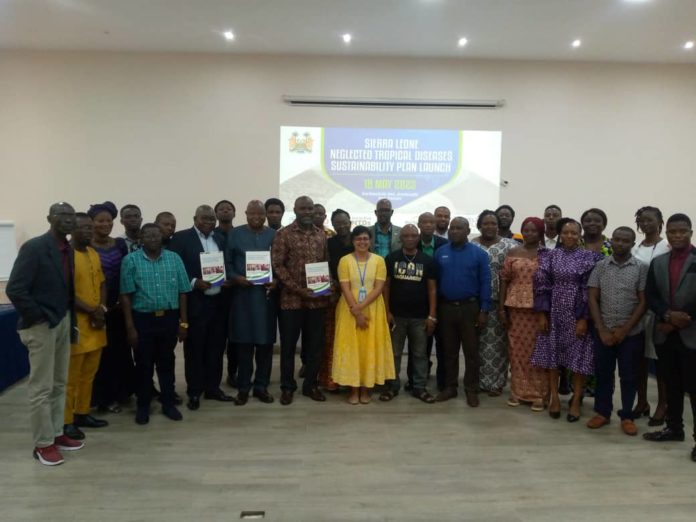By Ibrahim Kabba Turay
As a way of improving and solving neglected tropical diseases in Sierra Leone, Helen Keller Intl, Ministry of Health and Sanitation and partners, have launched the sustainability plan to help eradicate the diseases.
The launch was done on Thursday, 18th May, at the New Brookfields Hotel, Jomo Kenyatta Road in Freetown.
The Neglected Tropical Disease (NTD) over the years have affected all the 16 health districts (HDs) in Sierra Leone, putting over 9.5 million people at risk of developing at least one NTD, and mostly debilitating and disproportionately affecting the poor and vulnerable,particularly women and children.
Chief Medical Officer (MoHs), Dr. Matthaw Vandy, said Sierra Leone is endemic for four preventive chemotherapy NTDs Lymphatic Filariasis (LF) or ‘bigfut’ Onchocerciasis (Oncho) or river blindness, schistosomissis (SCH) or mansoni, and Soil-transmitted helminthes (STH) or worrum.
He said baseline studies conducted in 2007/08 established that ‘bigfut’ was prevalent in all 16 districts and that in 2005 river blindness prevalent was classified as hyper-endemic in 14 districts.
He added that 9 million people were no longer at risk for ‘bigfut’ after achieving the criteria for stopping NTDs in 15 districts.
He added that in 2022/23, out of 4 hotspot districts areas with persistent ‘bigfut’ achieved the criteria to stop NTDs.
“This means that the prevalence of ‘bigfut has been considerably reduced due to enhanced community engagement,” he said.
He said MoHs is committed to help in the implementation of the project and ensuring that people all over the country get the message.
He continued that result of the 2016 impact assessment survey showed a reduction in the prevalence and intensity of schistomiasis from a baseline of 40.1 to 18.9% in the 9 endemic districts.
Chief Programme Officer, Helen Keller International, Shaw Baker said it has been incredibly inspiring to see the change in the landscape after decade of hiatus, and a delight to directly re-engaged.
“Helen Keller has been engaged in eliminating these diseases for decades. In fact, it is in our DNA. Our co-founder, Helen Keller’s world-renowned teacher, Annie Sullivan, went blind from trachoma. Just a few days ago, the World Health Organization announced that a West African neighbor, Mali has been declared free of blinding trachoma – a scourge that was endemic in every district of the country 20 years ago,” he said.
He said they measured success by the number of people being reached with mass drug administration to prevent the diseases and the number of people with trichiasis getting surgery.
“Today, we are facing a remarkable challenge, how do we communicate the many millions of people now liberated from these debilitating conditions, for generations to come, diseases that have been haunting humanity for millennia,” he said.
He continued that he had the great fortune of spending a few days here in Sierra Leone visiting people and communities affected by lymphatic filariasis and the front-line health workers who have been fighting the disease.
“Nothing makes the success of the two decades of efforts more concrete than their stories, and they also make clear what the next steps are. We gather here to launch this sustainability plan for the elimination of neglected tropical diseases here in Sierra Leone, their experiences make very real what we are committed to sustaining.”





